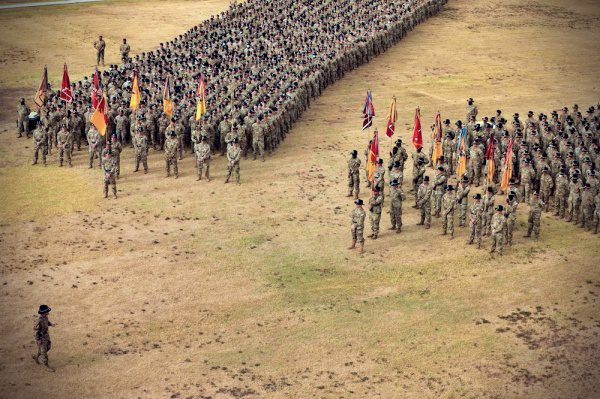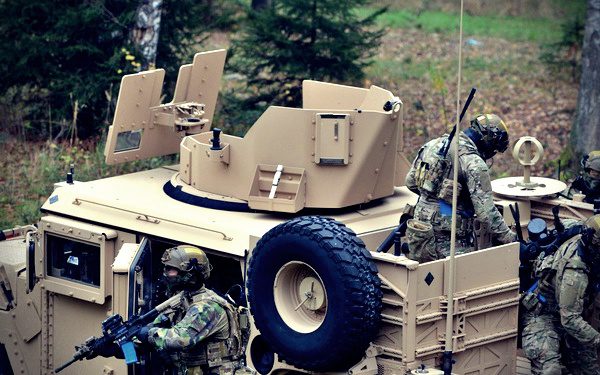Evidence that reasonably tends to negate guilt, reduces the degree of guilt, or reduces punishment (disclose as soon as practicable).
Sources on mandatory disclosure or notice requirements
RCM 701(a)(6). The trial counsel shall disclose evidence which reasonably tends to:
- Negate guilt
- Reduce the degree of guilt, or
- Reduce the punishment
Brady v. Maryland, 373 U.S. 83 (1963)
In a death penalty case, the government did not disclose a statement where the codefendant admitted to being the actual killer. The Court stated that the government must disclose evidence that is favorable to the accused and material to either guilt or punishment.
AR 27-26, para. 3.8(d). Trial counsel will disclose all evidence that tends to:
- Negate guilt
- Mitigate the offense, or
- Mitigate the sentence.
See United States v. Behenna, 71 M.J. 228 (C.A.A.F 2012); United States v. Kinzer , 39 M.J. 559, 562 (A.C.M.R. 1994); United States v. Adens, 56 M.J. 724 (Army Ct. Crim. App. 2002).
Favorable Impeachment information.
Banks v. Dretke , 124 S. Ct. 1256 (2004); Strickler v. Greene,
527 U.S. 263, 281 (1999); Kyles v. Whitley, 514 U.S. 419 (1995); United States v. Bagley, 473 U.S. 667 (1985) ; Giglio v. United States , 405 U.S. 150 (1972).
This impeachment information may include:
- Any promise of immunity or leniency offered to a witness in exchange for testimony.
See, e.g., Giglio v. United States , 405 U.S. 150 (1972); Napue v. Illinois , 360 U.S. 264 (1959). - Specific instances of conduct of a witness for the purpose of attacking the witness’s credibility or character for truthfulness. See, e.g., United States v. Watson , 31 M.J. 49 (C.M.A. 1990) (finding evidence that witness had monetary interest in outcome of case could have been favorable)
United States v. Mahoney , 58 M.J. 346 (C.A.A.F. 2003) (holding that trial counsel’s failure to disclose a letter impeaching government’s expert witness was reversible error). - Evidence in the form of opinion or reputation as to a witness’s character for truthfulness.
- Prior inconsistent statements. See, e.g., United States v. Romano, 46 M.J. 269 (C.A.A.F. 1997);
Graves v. Cockrell , 351 F. 3d 156 (5th Cir. 2003). See also MRE 613(a) (e) Information to suggest that a witness is biased. See, e.g., Bagley , 473 U.S. at 667; Banks , 124 S. Ct. 1256 (2004) (finding that the State’s failure to disclose that key state witness in capital sentencing proceeding was a paid government informant and played an important role in setting up Banks’ arrest was error). United States v. Romano, 46 M.J. 269 (C.A.A.F. 1997). The trial counsel had a duty to disclose statements by witnesses at the Art. 32 investigation of co-accuseds, where the prior statements were inconsistent with the government’s main witness’ testimony at trial.
Scope of the government’s duty
The prosecutor does not have to have actual knowledge of the evidence to commit a Brady violation. See Kyles v. Whitley 514 U.S. 419 (1995);Giglio v. United States, 405 U.S. 150 (1972);United States v. Mahoney , 58 M.J. 346 (C.A.A.F. 2003); Bailey v. Rae , 339 F.3d 1107 (9th Cir. 2003).
- Discovery and Expert Assistance under the UCMJ
- Appointment and Production of Expert Assistance
- Appointment and Production of Expert Witnesses
- Discovery and trial advocacy
- Defense Discovery Responsibilities and Requests
- Disclosures or notices made upon government request (not based on reciprocity)
- Mandatory disclosure or notice requirements for defense counsel
- Disclosures made upon government requests (based on reciprocity)
- Discovery in the Military Justice system
- Government requests for discovery
- Introduction to discovery in the military
- Duty to preserve evidence
- Enforcement
- Regulation of production of witness and evidence under the UCMJ
- Regulation of Discovery
- Protective and modifying orders
- Remedies for Nondisclosure
The government may be required to look beyond its files for exculpatory evidence. United States v. Williams, 50 M.J. 436 (C.A.A.F. 1999). The scope of the government’s duty to search with beyond the prosecutor’s own files generally is limited to: The files of law enforcement authorities that have participated in the investigation of the subject matter of the charged offenses. Id. at 441. (i) United States v. Bryan, 868 F.2d 1032, 1036 (9th Cir. 1989) (the “prosecutor will be deemed to have knowledge of and access to anything in the possession, custody, or control of any federal agency participating in the same investigation of the defendant.”)
United States v. Simmons , 38 M.J. 376 (C.M.A. 1993) (holding that trial counsel must exercise due diligence in discovering the results of exams and tests which are in possession of CID). United States v. Sebring , 44 M.J. 805 (N-M. Ct. Crim. App. 1996) (holding that trial counsel had a duty to discover quality control investigation into problems at Navy drug lab that tested the accused’s urine sample). (iv) Kyles v. Whitley, 514 U.S. at 437 (“the individual prosecutor has a duty to learn of any favorable evidence known to the others acting on the government’s behalf in the case, including the police”).
Investigative files in a related case maintained by an entity closely aligned with the prosecution.
United States v. Williams , 50 M.J. at 441. (i) United States v. Hankins, 872 F. Supp. 170, 173 (D.N.J. 1995) (“when the government is pursuing both a civil and criminal prosecution against a defendant stemming from the same underlying activity, the government must search both the civil and criminal files in search of exculpatory material.”)
Investigative files of tangential or unrelated investigations if specifically requested by the defense.
Williams , 50 M.J. at 441; United States v. Veksler , 62 F.3d 544 (3d Cir. 1995) (the request provides constructive notice to the prosecution about the existence of the files). (These requests should also be analyzed under RCM 701(a)(2).) (i) United States v. Green, 37 M.J. 88, 89 (C.M.A. 1993). The defense requested “[a]ny record of prior conviction, and/or nonjudicial punishment of” any government witness. The trial counsel responded without comment. The CID agent had an Art. 15 for fraternization, false claim, and larceny. Error was harmless beyond a reasonable doubt because the CID agent was only used to authenticate physical evidence. (3) The Brady rule is designed to ensure the defendant learns of exculpatory evidence that is known only to the government. If the defendant knows or should know the essential facts permitting him to take advantage of the exculpatory evidence (like the witness’ identity), then the government does not have a duty to disclose the information. United States v. Grossman , 843 F.2d 78, 85 (2d Cir. 1988) (no Brady violation when the defense knew the witness’ name; that he might have testified before a grand jury; and that the testimony might have been favorable).
Understanding and applying RCM 701(a)(6) and Brady at trial. Applying RCM 701(a)(6) and Brady at trial is not that difficult. Typically, these issues arise when the government makes a late disclosure or the defense discovers this evidence on its own late in the process. Everyone knows about the evidence (they are, after all, litigating about it). The real problem is that the defense needs more time to prepare for trial based on this newly discovered evidence. The military judge just needs to fashion a just action in response under RCM 701(g), which will probably be to grant a continuance.
Whether disclosure is sufficiently complete or timely to satisfy Brady can only be evaluated in terms of “the sufficiency, under the circumstances, of the defense’s opportunity to use the evidence when disclosure is made.” Leka v. Portuondo, 257 F.3d 89, 100 (2d Cir. 2001). “The opportunity for use under Brady is the opportunity for a responsible lawyer to use the information with some degree of calculation and forethought.” Id. at 103.
The key point is that, in the military, under RCM 701(a)(6) (and for Army attorneys, under AR 27-26, para. 3.8(d)), the trial counsel must always disclose favorable matter , whether or not that matter may later be found to be material or not.
The RCM 701(a)(6) language uses the phrase “reasonably tends” rather than the Brady term “material.” Under Brady, if the government fails to disclose favorable information, that non- disclosure violates due process only if the matter was material.
Kyles v. Whitley, 514 U.S. 419, 434 (1995); Cone v. Bell , 129 S.Ct. 1769 (2009). If a local jurisdiction has not implemented rules like RCM 701(a)(6) or AR 27-26, para. 3.8(d), then the prosecutor might consider whether favorable evidence is material before disclosing. That is not the case in our practice.
The phrase “reasonably tends” can be readily applied at during trial proceedings, where the parties are arguing prospectively. The term “material” is essentially a test for prejudice that is applied retrospectively, on appeal, where the defense has only now learned of the evidence. The issue on appeal is whether the first trial should be set aside based on this discovery violation. As such, much of the case law related to the term “material” may not translate well to litigation at trial. At trial, use “reasonably tends.”
The case law that has developed around the term “favorable” does have application at trial litigation, but again, if the issue is being litigated at trial, then the defense knows about the evidence and the real issue is whether the defense has enough time to prepare based on that new knowledge. And, if the defense has made a discovery request under RCM 701(a)(2), the defense does not have to make a showing that the evidence is “favorable.” Under that rule, the information only needs to be “material.”
Understanding and applying RCM 701(a)(6) and Brady on appeal. Applying RCM 701(a)(6) and Brady on appeal is more complex. The issue now is whether the matter was favorable; whether the government failed to properly disclose; and whether the defendant suffered prejudice as a result (the “material” inquiry). See generally, Strickler v. Greene, 527 U.S. 263 (1999).
Scope of government’s duty to disclose. If there is no specific request by the defense, use material.
A failure to disclose is material if there is a reasonably probability that there would have been a different result at trial had the evidence been disclosed. Kyles v. Whitley , 514 U.S. 419, 434 (1995). The Supreme Court in Banks v. Dretke, 540 U.S. 668 (2004), reiterated that the touchstone of materiality is the Kyles case.
“The question is not whether the defendant would more likely than not have received a different verdict with the evidence, but whether in its absence he received a fair trial, understood as a trial resulting in a verdict worthy of confidence.”Kyles, 514 U.S. at 434. In cases of knowing use of perjured testimony by the prosecutor, the failure to disclose favorable evidence is material unless the failure to disclose is harmless beyond a reasonable doubt.United States v. Bagley, 473 U.S. 667 (1985).
If there is a specific defense request under RCM 701, then use harmless beyond a reasonable doubt. (a) Where the defense makes a specific discovery request under RCM 701 and the government fails to disclose that evidence, the standard of review is harmless beyond a reasonable doubt.United States v. Roberts, 59 M.J. 323 (C.A.A.F. 2004). This heightened standard is often incorrectly confused with Brady material analysis (reasonable probability of different result).See United States v. Figueroa, 55 M.J. 525 (A.F. Ct. Crim. App. 2001). The source of the “harmless beyond a reasonable doubt” standard is Article 46 and RCM 701, not Brady. United States v. Eshalomi, 23 M.J. 12 (C.M.A. 1986); United States v. Hart, 29 M.J. 407 (C.M.A. 1990); Roberts, 59 M.J. 323.
Comparison to RCM 701(a)(2). If the defense makes a specific discovery request under RCM 701(a)(2) (discussed below), the government must provide the information if, among other things, it is material to the preparation of the defense. Unlike RCM 701(a)(6) and Brady , there is no requirement that the information be favorable. It can be unfavorable and still be material to the preparation of the defense. Unlike RCM 701(a)(6) and Brady, the government only has to disclose RCM 701(a)(2) information if requested by the defense.
Where the defense makes a specific discovery request under RCM 701 and the government fails to disclose that evidence, or where there is prosecutorial misconduct, the standard of review is harmless beyond a reasonable doubt .United States v. Roberts , 59 M.J. 323 (C.A.A.F. 2004). This heightened standard is often incorrectly confused with Brady material analysis (reasonable probability of different result).See United States v. Figueroa 55 M.J. 525 (A.F. Ct. Crim. App. 2001).
The scope of the government’s duty to locate the evidence is different under RCM 701(a)(2) than under RCM 701(a)(6) and Brady. Under RCM 701(a)(2), the trial counsel must search that which is within the “possession, custody, or control of military authorities,” which includes non law-enforcement authorities. Under RCM 701(a)(6) and Brady , the trial counsel must search her files, files of other law enforcement agencies that have been involved in the investigation, files of related cases maintained by an entity closely aligned with the prosecution.
Miscellaneous.
The duty to disclose favorable evidence exists even without a request by the accused. United States v. Agurs, 427 U.S. 97, 107 (1976).
Bad faith on the part of the government not required. Brady v. Maryland, 373 U.S. 83 (1963).
The Constitution does not require the pre-guilty plea disclosure of impeachment information. The Court noted that disclosure of impeachment information relates to the fairness of a trial, as opposed to the voluntariness of a plea. Impeachment information, the Court declared, is particularly difficult to characterize “as critical information of which the defendant must always be aware prior to pleading guilty given the random way in which such information may, or may not, help a particular defendant.” United States v. Ruiz, 536 U.S. 622 (2002).
- Charges (as soon as practicable). RCM 308(a).
- Within 24 hours to both accused and defense counsel. Rules of Practice, at 1.
- Allied papers (as soon as practicable after service of charges). 701(a)(1):
- Any papers that accompanied the charges when referred;
- The convening orders.
- Also, ERB/ORB. Rules of Practice, at 1.
- Sworn or signed statements (as soon as practicable after service of charges). RCM 701(a)(1):
- Any sworn or signed statement relating to an offense charged which is in the possession of the trial counsel.
- Report of Article 32 investigation (promptly). RCM 405(j)(3).
- Merits witnesses (before the beginning of the trial on the merits). RCM 701(a)(3).
- The trial counsel shall notify the defense of the names and addresses of the witnesses the trial counsel intends to call: (1) In the prosecution case-in-chief; and (2) To rebut a defense of alibi, innocent ingestion, or lack of mental responsibility, when the trial counsel has received timely notice of such a defense.
- The Rules of Practice, at 21, requires notice ten days prior to trial.
- Prior convictions of the accused (before arraignment). RCM 701(a)(4).
- The trial counsel shall notify the defense of any records of prior civilian or court-martial convictions of the accused of which the trial counsel is aware and which the trial counsel may offer on the merits for any purpose, including impeachment.
“Section III” disclosures under the Military Rules of Evidence.
Grants of immunity or leniency (prior to arraignment or within a reasonable time before the witness testifies). MRE 301.
The grant must be reduced to writing. See also Giglio v. United States , 405 U.S. 150 (1972).
Accused’s statements (prior to arraignment). MRE 304(d)(1).
The prosecution shall disclose all statements of the accused, oral or written, that are relevant to the case irrespective of intent to use at trial. “All statements:” Includes remarks made during informal conversations. United States v. Callara , 21 M.J. 259, 262 (C.M.A. 1986). Is not limited to those made to military superiors or law enforcement. United States v. Trimper , 28 M.J. 460, 468 (C.M.A. 1989). provide timely notice of an intent to offer a statement that was not disclosed prior to arraignment. MRE 304(d)(2).
Evidence seized from the accused or property owned by the accused (prior to arraignment). MRE 311(d)(1). The prosecution shall disclose all evidence seized from the accused or property owned by the accused, that it intends to offer into evidence against the accused at trial. (1) provide timely notice of an intent to offer this evidence that was not disclosed prior to arraignment. MRE 311(d)(2)(B).
Identifications (prior to arraignment). MRE 321(c)(1).
The prosecution shall disclose all evidence of prior identifications of the accused that it intends to offer into evidence against the accused at trial. (1) provide timely notice of an intent to offer lineup evidence that was not disclosed prior to arraignment. MRE 321(c)(2)(B).
The Rules of Practice requires disclosure not later than two duty days after the trial date is set if arraignment is the day of trial.
Similar sex assault or molestation crimes (5 days prior to trial). MRE 413 and 414.
If the government intends to offer evidence of similar crimes (sexual assault or child molestation), the trial counsel must notify the defense of its intent and disclose the evidence. 10. Testing may consume only available samples of evidence. United States v. Garries , 22 M.J. 288, 293 (C.M.A. 1986). Inform the accused when testing may consume the only available samples and permit the defense an opportunity to have a representative present. 11. Residual hearsay (sufficiently in advance of trial to provide fair opportunity to respond). MRE 807.
The proponent of residual hearsay must give the opponent notice of the intent to offer out-of-court statements as residual hearsay. See United States v. Holt , 58 M.J. 227 (C.A.A.F. 2003) (holding that Air Force Court of Criminal Appeals abused its discretion when it affirmed the introduction of residual hearsay statement when there was no indication in the record as to whether the required notice was given and by misapplying the foundational requirement of necessity). 12. Aggravating circumstances in capital cases (before arraignment). RCM 1004(b)(1)(B). 13. Judicial notice of a foreign law (reasonable time). MRE 201A(b). 14. Original writing in possession of other party. MRE 1004(3). 15. Evidence of a conviction more than 10 years old (sufficient advance notice as to provide a fair opportunity to contest the use). MRE 609(b). 16. Notice of intent to employ an expert at government expense (in advance of employment). RCM 703(d).




